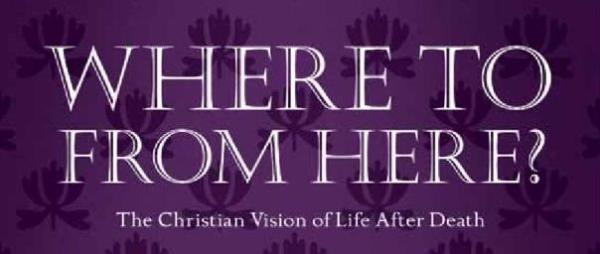Fr Brian Grogan’s book on the Christian vision of life after death is a real tonic for anyone who shies away from meditating on what the Church used to refer to cryptically as ‘the Last Things’, namely death, heaven, hell, purgatory and judgement. It is a tonic not only because of its attractive and clear presentation, but because the author gives a positive and hopeful boost to the ways in which we reflect on and face up to these challenging aspects of our faith.
In recent times, it has become the norm for any memorial service that takes place outside the context of a sacramental funeral Mass to be a secularised ‘celebration of the dead person’s life’, with relatives’ testimonies and favourite songs. Looking back over a life has displaced the idea of facing forward with the deceased in any meaningful sense. Of course, remembering the good things about a person’s life can help to ease the pain of grief and loss, but increasingly mourners are left with a hopeless sense of finality as they drift back to their daily lives. Grogan’s book is a valuable contribution to the rediscovery of the hope that characterises the Christian understanding of life after death.
Consisting of five chapters, each divided again into four or five brief parts, this brilliant, catechetical workbook is rooted in Scripture, the Church Fathers, contemporary theologians and the Catechism of the Catholic Church. From the outset, Brian Grogan takes us back to the roots of Christian faith. The first section of the first chapter is entitled, ‘Why believe in God?’ and it begins by teasing out the key questions that we all ask of ourselves. Grogan suggests that, ‘“What explains me?” is the real issue, rather than “what explains God?”’ (p. 20) Recasting the traditional catechetical starting points in this way shifts our focus onto our own experiences of reality. In so doing, Grogan changes the way in which we ask and answer the fundamental questions and throughout the rest of the book, which is filled with familiar, practical anecdotes, he leads us through his basic argument:
...that universal salvation is a legitimate hope, but not a divine guarantee. We must not presume on it! Next, ‘being saved’ does not mean that we can scrape in to the cosmic party by straightening a tie or adjusting a hairstyle at the door. We are invited into nothing less than becoming truly sons and daughters of God. Membership of the divine community awaits us, and it calls for radical interior change so that we become like God (see Mt 5:48). In this life our task already is to become members of the Network of Good People of whom Jesus is the pivotal figure. We are therefore to grow steadily in agape love, to make this world a better place in which the koinonia can flourish.(p. 151)
The separate chapters unpack this summary carefully, informed always by the Christian hope that is to be found at the heart of even the most difficult concepts. Jesus’s words about Hell are ‘to be understood as a dramatic exhortations to conversion while there is still time’ (p. 138). Personal death is set in the context of the ‘communion of saints’, past and present. Purgatory is presented as a ‘remedial education in loving’, a ‘post mortem saving action’. Throughout, we are reminded that ‘God is on our side’. Thus, ‘Death relativises and humbles all human achievement; it calls us to strengthen our relationship with God, to move close to the source of life and love if we are to be truly alive. We pass from death to life by loving, because “love never ends” (1 Cor 13:8)’ (p. 110).
Brian Grogan deals in short, practical propositions that are reasonable and accessible, and the summaries and personal ‘ponderings’ that accompany his explanations ensure that they are digested. He thereby builds gradually a complex picture of fundamental theology. What emerges is a whole that is greater than the sum of its parts. This set of essays would make a useful parish group workbook, as well as a good handbook for personal reflection. Having reached the last paragraph more confident in handling questions about ‘the Last Things’, I turned back to the beginning to go through it again, my understanding not quite there yet, but far nearer than before.
The reviewer, John Battle, is former Member of Parliament for Leeds West.
![]() Find this book on the Veritas web site
Find this book on the Veritas web site![]() Read an extract from Where to From Here? on Thinking Faith
Read an extract from Where to From Here? on Thinking Faith
![]() Shop for this book on Amazon, giving a 5% cut to the Jesuit Refugee Service, UK
Shop for this book on Amazon, giving a 5% cut to the Jesuit Refugee Service, UK






